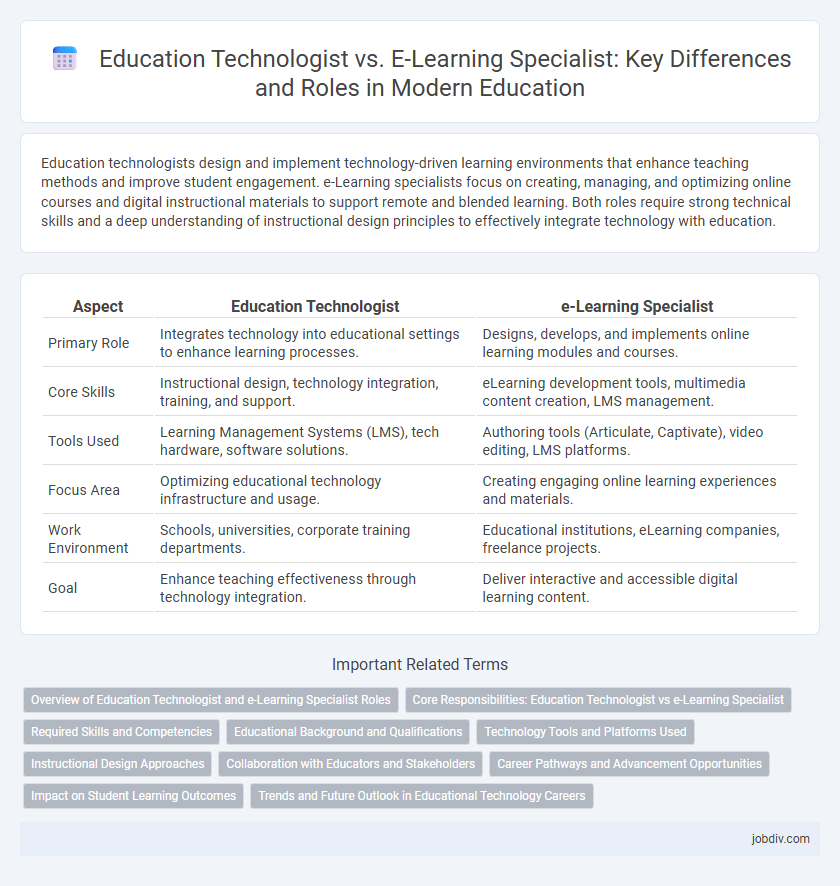Education technologists design and implement technology-driven learning environments that enhance teaching methods and improve student engagement. e-Learning specialists focus on creating, managing, and optimizing online courses and digital instructional materials to support remote and blended learning. Both roles require strong technical skills and a deep understanding of instructional design principles to effectively integrate technology with education.
Table of Comparison
| Aspect | Education Technologist | e-Learning Specialist |
|---|---|---|
| Primary Role | Integrates technology into educational settings to enhance learning processes. | Designs, develops, and implements online learning modules and courses. |
| Core Skills | Instructional design, technology integration, training, and support. | eLearning development tools, multimedia content creation, LMS management. |
| Tools Used | Learning Management Systems (LMS), tech hardware, software solutions. | Authoring tools (Articulate, Captivate), video editing, LMS platforms. |
| Focus Area | Optimizing educational technology infrastructure and usage. | Creating engaging online learning experiences and materials. |
| Work Environment | Schools, universities, corporate training departments. | Educational institutions, eLearning companies, freelance projects. |
| Goal | Enhance teaching effectiveness through technology integration. | Deliver interactive and accessible digital learning content. |
Overview of Education Technologist and e-Learning Specialist Roles
Education Technologists integrate digital tools and innovative technologies to enhance curriculum design and classroom experiences, focusing on system implementation and user training. E-Learning Specialists develop and manage online courses, ensuring content is pedagogically sound and engaging through multimedia and interactive elements. Both roles prioritize improving learning outcomes but differ in scope, with Education Technologists emphasizing technology infrastructure and e-Learning Specialists concentrating on virtual content delivery.
Core Responsibilities: Education Technologist vs e-Learning Specialist
Education Technologists focus on integrating innovative technologies into curriculum design, managing learning management systems, and providing technical support to optimize educational delivery. e-Learning Specialists develop digital course content, design interactive multimedia learning experiences, and analyze learner data to enhance online education effectiveness. Both roles emphasize technology-enhanced learning but differ in scope, with Education Technologists overseeing infrastructure and strategy, while e-Learning Specialists concentrate on content creation and pedagogical design.
Required Skills and Competencies
Education Technologists require strong technical skills in instructional design software, data analysis, and emerging educational technologies, along with expertise in curriculum development and project management. e-Learning Specialists focus on proficiency in multimedia content creation, learning management systems (LMS), and user experience (UX) design, emphasizing effective online course delivery and learner engagement strategies. Both roles demand excellent communication skills, problem-solving abilities, and a deep understanding of pedagogical principles to enhance digital learning environments.
Educational Background and Qualifications
Education Technologists typically hold degrees in Educational Technology, Instructional Design, or Computer Science, often complemented by certifications in project management or systems analysis. e-Learning Specialists usually have a background in Education, Curriculum Development, or Multimedia Design, with additional expertise in learning management systems and digital content creation. Both roles demand strong proficiency in technology integration and pedagogical theories to enhance learning experiences effectively.
Technology Tools and Platforms Used
Education Technologists primarily focus on integrating a broad range of technology tools such as learning management systems (LMS), virtual reality (VR), and augmented reality (AR) platforms to enhance overall educational environments. e-Learning Specialists specialize in creating and managing online courses using specific tools like Articulate Storyline, Adobe Captivate, and Moodle for course development and delivery. Both roles require expertise in leveraging digital platforms to improve learner engagement and instructional effectiveness.
Instructional Design Approaches
Education Technologists integrate advanced learning tools and digital platforms to enhance instructional design through innovative technology-driven strategies. e-Learning Specialists focus on creating engaging, interactive online content by employing evidence-based instructional design models like ADDIE or SAM to optimize learner engagement and knowledge retention. Both roles prioritize learner-centered approaches but diverge in their emphasis on technological infrastructure versus content development within digital education environments.
Collaboration with Educators and Stakeholders
Education Technologists facilitate collaboration by integrating cutting-edge instructional technologies with curriculum design, enabling educators to enhance teaching effectiveness and student engagement. e-Learning Specialists work closely with stakeholders to develop tailored digital content and ensure seamless delivery through learning management systems, fostering continuous feedback and improvement. Both roles prioritize communication and teamwork to align technological solutions with educational goals and institutional needs.
Career Pathways and Advancement Opportunities
Education Technologists typically focus on integrating technology into curriculum design and instructional practices, advancing towards roles such as Director of Educational Technology or Chief Learning Officer. e-Learning Specialists concentrate on creating digital learning content and managing Learning Management Systems (LMS), with career progression leading to positions like E-Learning Manager or Online Program Coordinator. Both career paths offer opportunities for specialization in instructional design, digital analytics, and technology strategy, aligning with the growing demand for tech-driven education solutions.
Impact on Student Learning Outcomes
Education Technologists enhance student learning outcomes by integrating innovative technologies and data analytics to create personalized and engaging educational experiences. e-Learning Specialists focus on designing, developing, and implementing digital learning content and platforms that increase accessibility and improve knowledge retention for diverse learner populations. Both roles contribute to optimizing instructional strategies, but Education Technologists emphasize systemic technology integration while e-Learning Specialists concentrate on content delivery and user experience.
Trends and Future Outlook in Educational Technology Careers
Education Technologists increasingly integrate artificial intelligence and data analytics to personalize learning experiences and improve educational outcomes, reflecting a shift towards adaptive learning technologies. e-Learning Specialists focus on designing immersive, interactive content using virtual and augmented reality tools to enhance student engagement and retention. Both roles are expected to grow rapidly as institutions prioritize digital transformation and lifelong learning, with emerging trends emphasizing cross-disciplinary skills in technology and pedagogy.
Education Technologist vs e-Learning Specialist Infographic

 jobdiv.com
jobdiv.com